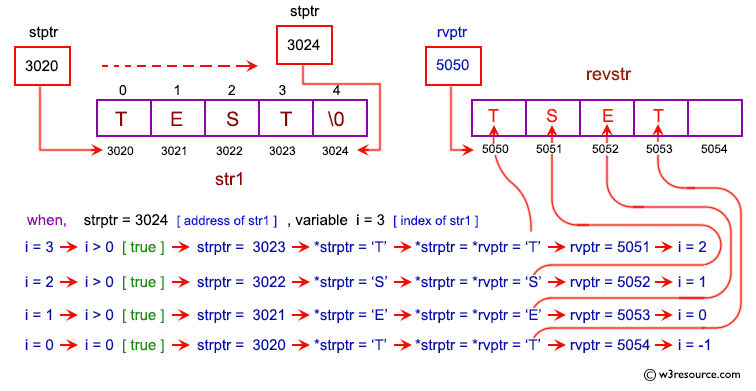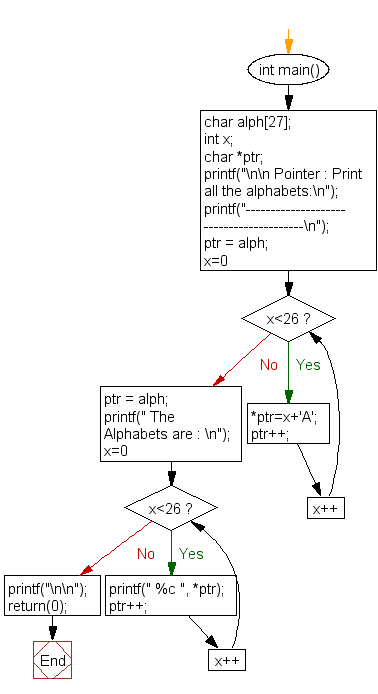C Exercises: Print all the alphabets
C Pointer : Exercise-21 with Solution
Write a program in C to print all the alphabets using pointer.
Pictorial Presentation:

Sample Solution:
C Code:
#include <stdio.h>
int main()
{
char alph[27];
int x;
char *ptr;
printf("\n\n Pointer : Print all the alphabets:\n");
printf("----------------------------------------\n");
ptr = alph;
for(x=0;x<26;x++)
{
*ptr=x+'A';
ptr++;
}
ptr = alph;
printf(" The Alphabets are : \n");
for(x=0;x<26;x++)
{
printf(" %c ", *ptr);
ptr++;
}
printf("\n\n");
return(0);
}
Sample Output:
Pointer : Print all the alphabates: ---------------------------------------- The Alphabates are : A B C D E F G H I J K L M N O P Q R S T U V W X Y Z
Flowchart:

C Programming Code Editor:
Have another way to solve this solution? Contribute your code (and comments) through Disqus.
Previous: Write a program in C to show a pointer to an array which contents are pointer to structure.
Next: Write a program in C to print a string in reverse using a pointer.
What is the difficulty level of this exercise?
Test your Programming skills with w3resource's quiz.
C Programming: Tips of the Day
Static variable inside of a function in C
The scope of variable is where the variable name can be seen. Here, x is visible only inside function foo().
The lifetime of a variable is the period over which it exists. If x were defined without the keyword static, the lifetime would be from the entry into foo() to the return from foo(); so it would be re-initialized to 5 on every call.
The keyword static acts to extend the lifetime of a variable to the lifetime of the programme; e.g. initialization occurs once and once only and then the variable retains its value - whatever it has come to be - over all future calls to foo().
Ref : https://bit.ly/3fOq7XP
- New Content published on w3resource:
- HTML-CSS Practical: Exercises, Practice, Solution
- Java Regular Expression: Exercises, Practice, Solution
- Scala Programming Exercises, Practice, Solution
- Python Itertools exercises
- Python Numpy exercises
- Python GeoPy Package exercises
- Python Pandas exercises
- Python nltk exercises
- Python BeautifulSoup exercises
- Form Template
- Composer - PHP Package Manager
- PHPUnit - PHP Testing
- Laravel - PHP Framework
- Angular - JavaScript Framework
- Vue - JavaScript Framework
- Jest - JavaScript Testing Framework
